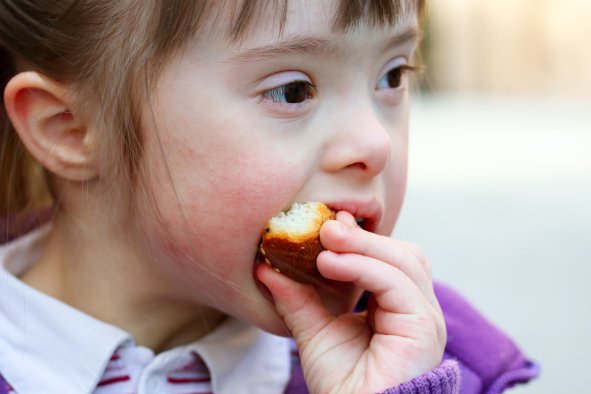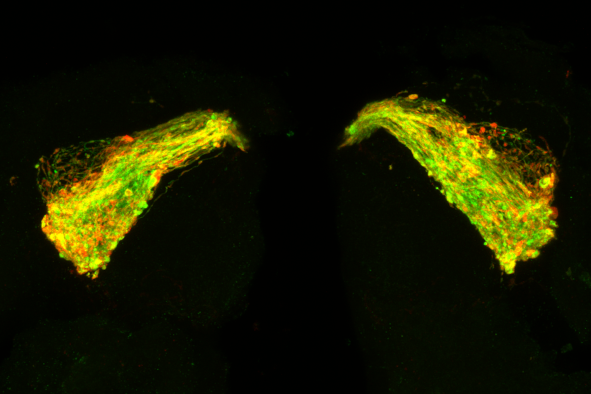They say you are what you eat. And while we aren't all walking around with French fries for fingers, our brain health is significantly influenced by the food we consume.
Newsweek spoke to Chartered Psychologist Kimberley Wilson to find out what she eats in a day to keep her brain and body healthy.
"I eat leafy, green vegetables every day," Wilson told Newsweek, "and that comes from data that found that older people who ate leafy greens every day had brains that were 11 years younger than their peers—11 years!"
Wilson said that a lot of this effect may be down to two key nutrients found in fruits and particularly green leafy vegetables. The nutrients are called lutein and zeaxanthin, which are best known for their role in supporting eye health. However, these powerful plant pigments may also protect us from neurodegeneration.
"A recent study found that levels of those two compounds were 50 percent lower in the brains of those who had died of Alzheimer's," Wilson said.
Along with these green, leafy vegetables, Wilson also makes sure to include a variety of different berries. Blueberries in particular have been the center of several studies into brain function, due to their rich supply of vitamins, fiber and antioxidants.
Lastly, Wilson makes sure to eat a high-fiber diet, of which berries play a large part. High-fiber diets have been associated with a reduced risk of dementia in a study of 3,700 healthy adults, and support a healthy gut microbiome, which is known to affect our overall physical and mental health.
Aside from a healthy diet, Wilson makes sure to stay active. "I exercise on a near daily basis, so about five days a week—six if I'm feeling particularly energetic," she said. "And that will be a combination of cardio and resistance exercise, because cardio helps to keep the 400 miles of blood vessels in your brain nice and flexible.
"On the other side is resistance training. And we know that, for example in older women, those who do resistance training have fewer and smaller lesions in their brain—that is, fewer areas of brain damage—because the same growth factors that help to support your muscle growth actually do the same thing for your brain cells."
Wilson also tries to take care of her sleep: "I'll use ear plugs, an eye mask, dark rooms and phones outside the bedroom."
Lastly, Wilson makes an effort to nurture her social relationships. "Social engagement is full of cognitive challenges," she said. "But it also reduces our risk of things like loneliness and depression, the stress of which can be really harmful to the brain.
"I'm mindful and conscious about getting back to people, remembering if someone was going to a health check-up and just letting them know that I'm thinking about them and investing in my relationships."
If you're struggling to adapt to these healthy lifestyle changes, Wilson previously spoke to Newsweek about ways to train your brain to eat more healthily and develop healthy habits.
Wilson discusses these ideas further on her podcast Stronger Minds and will be talking more about our diet and brain health at the New Scientist Live event, which will take place on October 12 and 13 at ExCeL London and can be streamed online.
Is there a health problem that's worrying you? Let us know via health@newsweek.com. We can ask experts for advice, and your story could be featured in Newsweek.
References
Devore, E. E., Kang, J. H., Breteler, M. M., & Grodstein, F. (2012). Dietary intakes of berries and flavonoids in relation to cognitive decline. Annals of neurology https://doi.org/10.1002/ana.23594
Dorey, C. K., Gierhart, D., Fitch, K. A., Crandell, I., & Craft, N. E. (2022). Low Xanthophylls, Retinol, Lycopene, and Tocopherols in Grey and White Matter of Brains with Alzheimer's Disease. Journal of Alzheimer S Disease, https://doi.org/10.3233/jad-220460
Morris, M. C., Wang, Y., Barnes, L. L., Bennett, D. A., Dawson-Hughes, B., & Booth, S. L. (2018). Nutrients and bioactives in green leafy vegetables and cognitive decline: Prospective study. Neurology, 90(3), e214–e222. https://doi.org/10.1212/WNL.0000000000004815
Yamagishi, K., Maruyama, K., Ikeda, A., Nagao, M., Noda, H., Umesawa, M., ... Iso, H. (2022). Dietary fiber intake and risk of incident disabling dementia: the Circulatory Risk in Communities Study. Nutritional Neuroscience, 26(2), 148–155. https://doi.org/10.1080/1028415X.2022.2027592
Disclaimer: The copyright of this article belongs to the original author. Reposting this article is solely for the purpose of information dissemination and does not constitute any investment advice. If there is any infringement, please contact us immediately. We will make corrections or deletions as necessary. Thank you.



